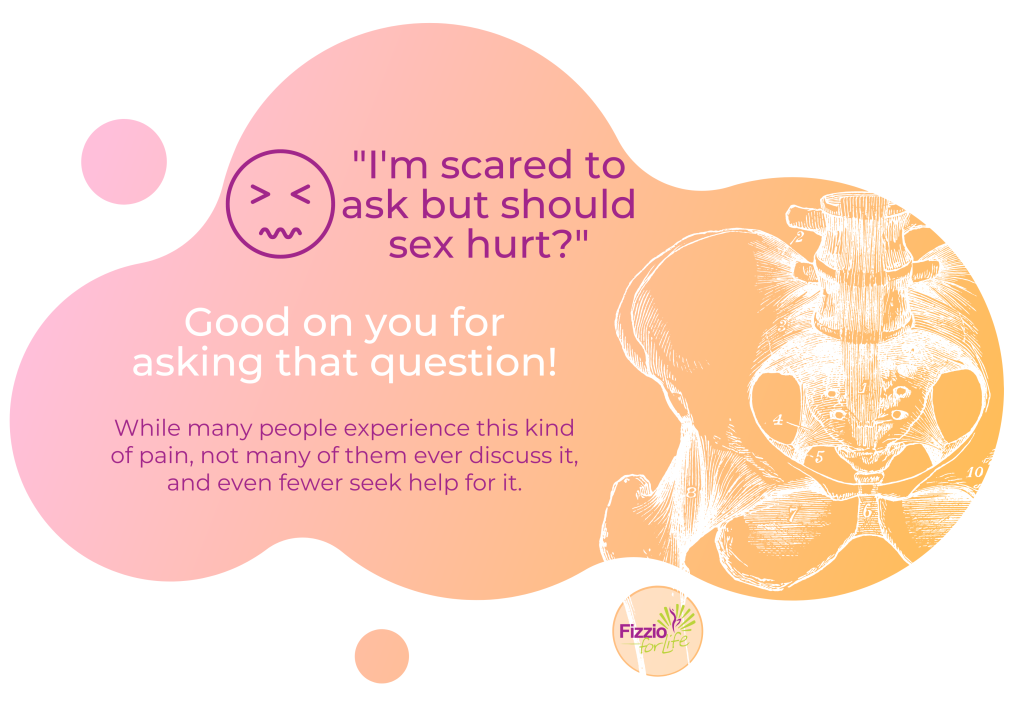A little while ago, I was at a get together with some friends. While all the guys were off doing the BBQ’ing thing, one of the girls said “While none of the guys are here, I have a question; Should my pelvis hurt while having sex?”
My first thought was: “Good on you for asking that question!” While many people experience this kind of pain, not many of them ever discuss it, and even fewer seek help for it. And while it is common, like so many other pelvic floor disorders, it is not normal. My next thought was: “I wonder what lies at the root of that pain?”
So lets start with talking a little about pain. Pain is a normal part of being human and is essential to our survival. It is our body’s way of alerting us to harm, or potential harm, so that we can change our behaviour in order to protect ourselves. Like when you touch a hotplate – that pain in your finger tells you to pull away, then you can check for damage do what you need to protect any wounds. Sometimes the experience will also cause muscles to activate in order to hold the injured area still and out of harm’s way, like when you’ve sprained your ankle and hold it up rather than putting weight through it. This type of pain usually passes as the damaged tissues heal.
However, pain is not always the direct result of damaged tissues. Sometimes the body’s alarm (pain) system becomes overactive or hypersensitive and normal activities that previously were not painful, or indeed previously were pleasurable, are now enough to raise the pain alarm. Kind of like those car alarms that used to be set off by someone just brushing past the rear vision mirror.
When it comes to pelvic and genital pain there are many reasons why acts of intimacy can be painful. It may be triggered by the tissues of the pelvic floor and its surrounding structures. This might be in be the result of things like tight or overprotective muscles, extra sensitive nerves, dysfunctional joints, scar tissue, posture, surgery or injuries to the tissues. It may be related to medical issues like Thrush, Endometriosis, Vulvodynia, Vaginismus, Bowel and Bladder problems, Medications or Hormone changes. But at the end of the day, ongoing pelvic pain is the result of a hypersensitive alarm system trying to protect you. Stress, anxiety and fear can also turn up that “protect” button and increase pain, and pain then leads to more stress and anxiety – and so on.
When it comes to treating ongoing pelvic pain – there is no one magic cure, nor one size fits all approach. Pelvic pain physiotherapy requires a multi-faceted approach involving treating nerves, muscles and joints, correcting posture, breathing and relaxation, stress management, appropriate exercise, desensitisation techniques, and education because knowledge and understanding helps reduce fear and that helps lower the sensitivity of the alarm system. We work with you to set goals, with your doctors who may provide medication, often with the help of psychologists or counsellors, and in some cases dieticians as what you eat and drink may compound the problem.
Unlike my friend, not many would raise this with their friends or family. We are all happy to talk about our sore backs, necks and knees, but when it comes to our pelvis and genital pain we just don’t share those experiences. Leaving many feeling like they are very alone in this experience, and unsure of what to expect or where to turn to for help.
Pain in the pelvis or genitals, whether it be while you are being intimate with someone or not, is complex and isn’t normal. But there is help out there, so if you or anyone you know is struggling with this, please reach out and seek some help, so you can transform these painful activities back to the pleasurable experience it should be.


